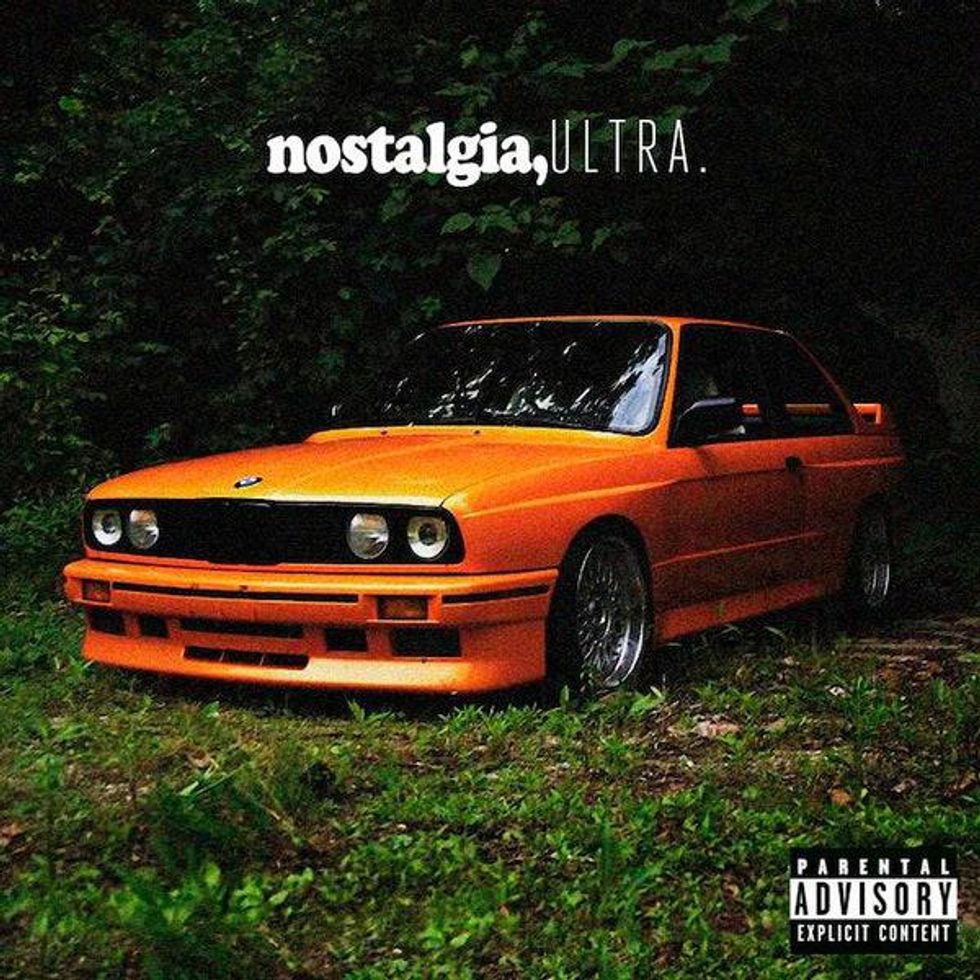
Nostalgia, Ultra Cover
Don’t play “Hotel California” by the Eagles around me unless you want to hear Frank Ocean’s “American Wedding” sung over the original lyrics.
On his 2011 mixtape, nostalgia,ULTRA, Frank Ocean famously sampled, covered, and remade everything from video game clips (notably from Street Fighter, which is referenced ubiquitously in his work) to films, to songs by Coldplay, MGMT, and, yes, the Eagles.
The rock band was not too happy about the uncredited, unapproved sample, but there was nothing they could do. Despite the fame and success of the mixtape, it was released for free, outside of any label affiliations, and Frank Ocean wasn’t making money from it.
“Why sue the new guy? I didn’t make a dime off that song. I released it for free. If anything I’m paying homage,” Frank Ocean said on his Tumblr page in response.
The short-lived controversy is barely a footnote in the album’s legacy, though the idea of Don Henley referring to Frank Ocean as “talentless” is laughable now. Today, the drama is mostly forgotten, while the album was an instrumental factor in launching Frank Ocean from unknown producer/songwriter to the icon who has changed the sound of music that he is today.
Before the release of nostalgia,ULTRA, Frank Ocean was still — according to the government and his song credits for artists like Justin Bieber and John Legend — Christopher Breaux. Raised in Louisiana, Frank left New Orleans after Hurricane Katrina, figuring if anything was a sign for him to leave home and pursue music, it was that.
Breaux found himself in LA and, though a mixture of luck and talent, was signed to Def Jam with the help of Tricky Stewart. But who was this kid Chris? The label, unwilling to devote the time or energy to finding an answer, ignored Frank, leading him to join Odd Future, the weird-kid skate/rap collective with Tyler, The Creator.
Soon after, with the help of Tricky Stewart and other collaborators, Frank released nostalgia,ULTRA on his Tumblr page with no promotion. This low-budget passion project would go on to make many end-of-year “best of” lists, peaking the interest of Kanye West and catapulting Chris to the kind of fame that would have him leaving his old life, and old name, behind.

nostalgia,ULTRA may be a collection of samples and sound-clips, but it’s wholly original. Tricky Stewart, collaborator and award-winning-song-writer/producer in his own right, said, “If that record was commercially released with proper clearance, I’m pretty sure you’re looking at album of the year.” The album’s avalanche effect on Frank’s career is testament to the barrier-breaking sound which now defines Frank.
2011 was a different time. Music genres were more precise, rap music was mainstream at that point but not yet as commercial and proliferated as it would be in the following years, and before social media and streaming became the industry-influencing giants they are now, labels still clung to archaic formulas of album releases, promotions, and press tours.
With no attention from his label, Frank was left to his own devices, so he did what he knew best: He got inspired. From rock bands to alternative-pop, Frank created a synergistic symphony which sounded like nothing anyone had ever heard before.
People tried to call it R&B, but he resisted, saying, “If you’re a singer and you’re Black, you’re an R&B artist. Period.” But he would not adhere to these boundaries, and the album makes explicit his conflicting passions. In “b*tches talking” Frank notes his romantic interests’ requests that he stop playing Radiohead, and in “Songs for Women,” a song in which he declares “all I write is love songs,” they still just play Drake and Trey Songz as in his car, making him say, “It’s like she never heard of me.”
Pitchfork called him “an indie kid when it comes to alienation,” and the references to sad-boy indie songs and classic rock singles from Van Halen to “Hallelujah” are a testament to that. The album paints a tapestry of influences, but what emerges is a distinct voice, one which croons with the best of the R&B singers, has the cadences and associative-sensibilities of rap music, and ruminates existentially on art and issues like queer love and being pro-choice.
In all these pieces, those borrowed from his favorite artists and those which could have been straight off an Odd Future track, the artist we know as Frank Ocean begins to emerge. The imprint the album leaves is one of a deft storyteller, a thoughtful musician, and an artist who refuses to be pinned down — doesn’t that sound familiar?
The album was so successful in generating a cult-like following that the label promised to release an EP version, though that never panned out. But it didn’t matter. The music was out there, and so was the name Frank Ocean. (Old) Kanye West was quick to call the kid behind the mixtape and feature him on his next album, a project with Jay-Z called Watch the Throne.
Suddenly, Frank was no longer just on the credits any more; he was featured in songs by Beyonce and her husband, finally recording his debut album, and set to perform at Coachella in 2012. But the cushion and the confidence did not make Frank comfortable.What nostalgia,ULTRA proved was Frank’s unwillingness to play it safe. Released in 2012, Channel Orange was an artistic masterpiece that mimicked the preceding record with its conceptual style and also included references and skits about Frank’s favorite movies and cultural phenomena.
Instead of vying to prove his originality by shunning samples and references (and not deterred by the Eagles disdain for his penchant for sampling), Frank dug deep into pop culture and pulled out transcendent masterpieces like “Forrest Gump” and the epic “Pyramids,” which retells and subverts the story of Cleopatra.
His thematic divergence from anyone in his proximity has come to define him. When Frank came out as bisexual (again, via Tumblr) in anticipation of Channel Orange, he cemented the sentiment in nostalgia,ULTRA’s “We All Try,” in which he resists binaries and says marriage is “between love and love.” His music took on a new valence for its boundary-breaking honesty and made him the queer icon he is today.
Despite some backlash (and, notably, a fight with Chr*s Br*wn, who called him a homophobic slur in a parking lot), the album received instant acclaim and won many awards, hailing Frank Ocean the voice at the vanguard of a movement that there still wasn’t a name for.
But again, Frank resisted the temptation to rest on his laurels. As with the release of nostalgia,ULTRA, Frank showed he was not motivated by industry interests. He finally broke from his label by releasing Endless in 2016, and (the day after), the album of the decade, Blonde.
But there could be no Blonde without nostalgia,ULTRA. nostalgia,ULTRA was the blueprint that gave Chris Breaux the confidence to take risks, break boundaries, and step into his fullest creative self as Frank Ocean. From the dismissal from his label that gave him his signature disdain for the industry, the cult-like success of the single which gave him his first set of devoted fans, and the co-signs from stars like Kanye, Jay-Z, and Beyonce, nostalgia,ULTRA was the beginning of Frank’s iconography.
And there can be no doubt, now that the new age of music is less genre-specific, less linear, and more experimental, that Frank was at the forefront of all the best music today.
Frank Ocean – nostalgia, ULTRA (Full Album)www.youtube.com














